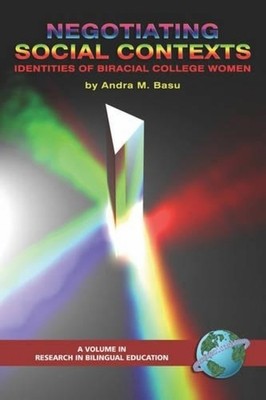
- We will send in 10–14 business days.
- Author: Andra Basu
- Publisher: Information Age Publishing
- ISBN-10: 1593115962
- ISBN-13: 9781593115968
- Format: 15.6 x 23.4 x 0.5 cm, softcover
- Language: English
- SAVE -10% with code: EXTRA
Reviews
Description
This book examines the identification choices of a group of biracial college women and explores how these identifications relate to their choices and constructions of different social contexts. It is a qualitative study that draws on recent psychological literature, as well as personal interviews and focus groups with a group of biracial college women. The book includes 1) a review of the relevant literature concerning biracial individuals, 2) a discussion of some of the unique issues facing researchers who work with biracial populations, and 3) an indepth examination of the relationship between identity and different social contexts for a group of biracial women. The book addresses issues critical to educators, counselors, policy makers and researchers who work with biracial students, as well as biracial individuals and their families. For example, it shows how, for this group of biracial college women, identity choices did influence their choices and constructions of social contexts, particularly at the school that they all attended. Yet while identification choices did influence their perceptions about their social contexts, other factors such as social barriers also influenced them. Family members played a role in their identification choices as well, but siblings were found to be more influential than parents. In addition, the book demonstrates how educators and biracial mentors had a significant impact on this particular group of biracial women. The implications of these findings for parents, educators and future researchers are considered, as the number of biracial individuals living in the United States continues to grow.
EXTRA 10 % discount with code: EXTRA
The promotion ends in 18d.00:20:14
The discount code is valid when purchasing from 10 €. Discounts do not stack.
- Author: Andra Basu
- Publisher: Information Age Publishing
- ISBN-10: 1593115962
- ISBN-13: 9781593115968
- Format: 15.6 x 23.4 x 0.5 cm, softcover
- Language: English English
This book examines the identification choices of a group of biracial college women and explores how these identifications relate to their choices and constructions of different social contexts. It is a qualitative study that draws on recent psychological literature, as well as personal interviews and focus groups with a group of biracial college women. The book includes 1) a review of the relevant literature concerning biracial individuals, 2) a discussion of some of the unique issues facing researchers who work with biracial populations, and 3) an indepth examination of the relationship between identity and different social contexts for a group of biracial women. The book addresses issues critical to educators, counselors, policy makers and researchers who work with biracial students, as well as biracial individuals and their families. For example, it shows how, for this group of biracial college women, identity choices did influence their choices and constructions of social contexts, particularly at the school that they all attended. Yet while identification choices did influence their perceptions about their social contexts, other factors such as social barriers also influenced them. Family members played a role in their identification choices as well, but siblings were found to be more influential than parents. In addition, the book demonstrates how educators and biracial mentors had a significant impact on this particular group of biracial women. The implications of these findings for parents, educators and future researchers are considered, as the number of biracial individuals living in the United States continues to grow.


Reviews